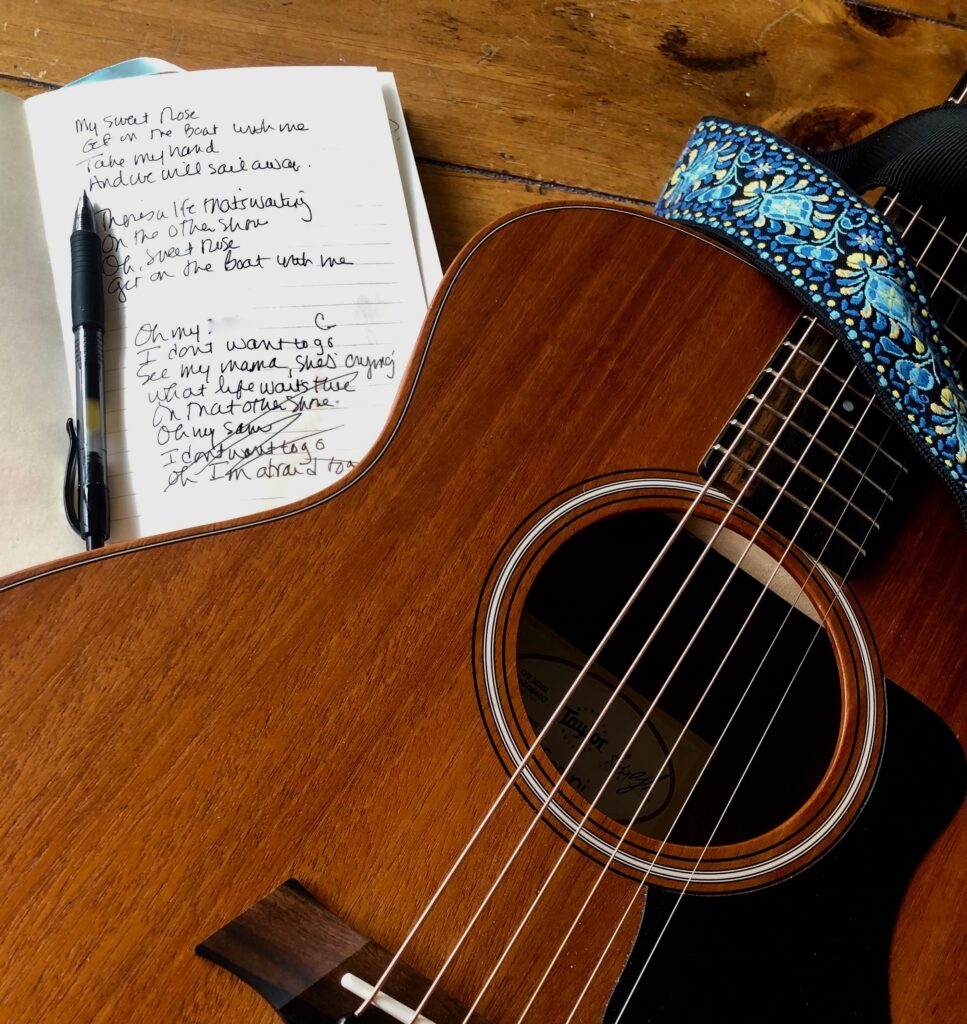
by Beth Dolinar, contributing writer
“For the shipwreck, start in a minor key.”
That was the advice from a seasoned songwriter who was among a group of guitar players and singers in what’s known as Folk Song Circle. It’s a long-running event sponsored by Calliope House, a Pittsburgh organization for people who love to perform and listen to folk music. Every month we gather to play and sing.
I joined about two years ago as a rank beginner. At first I fumbled my way through covers that need just three chords. Eventually, it was time to move on. I traded my beginner guitar for a somewhat better Taylor, opened a notebook and began to write.
As a writer, I’m well acquainted with the anxiety brought on by the blank page. To begin this short essay I stared at the blinking curser for long minutes before I finally typed the first words, then erased and started over. But that’s just words. How do I begin when there are words and the melody?
As they say, write what you know. I know the story of my great-great grandparents who were engaged sweethearts in Ireland during the Potato Famine. The ship on which they sailed to America wrecked off the coast of New England, and Peter and Rose were separated during the rescue. Peter made his way to Pittsburgh to work as a blacksmith, saving money to travel to New England to search for Rose. After seven years – seven years – they were reunited and married in Pittsburgh.
Now, that’s a story that sings.
I decided that Rose might be worried about the trip; Peter would have to remind her of the better life that await them on the other shore. And so began the first words of the song.
My sweet Rose, get on the boat with me.
Hold my hand and we will sail away.
A simple G chord, then an E minor, then landing on a D chord. It wasn’t much, just a simple melody and beginner strumming. But I was writing my first song. I knew it wasn’t good.
I wondered if all the great singer-songwriters started out this way, with just a few chords and lyrics that are far from poetry. Did Neil Young write some clunkers before “Heart of Gold?” How many songs did Joni Mitchell write and reject before she penned “Both Sides Now?”
And I wondered if I’ve just started too late. Jackson Browne was still in high school when he wrote “These Days,” with its brilliantly self-aware final line of Don’t confront me with my failures. I had not forgotten them.”
The kind of brain plasticity that allowed me to learn piano at age five eludes me now. My mature brain is struggling to write a song as a kindergartner would.
Since that first simple melody about setting sail, I’ve written two more songs about that story. I’ve learned that writing a song requires a guitar in my hands and a pencil behind my ear. It’s all trial and error, singing some words and putting them to different chords and then crossing that out and starting over. Hours pass and I don’t notice.
Song number four will be about the shipwreck. As suggested, I’ll be starting in a minor key, to capture the dark mood. My goal is to finish this song by next month, when I’ll join the others in the Guitar Circle.
I’ll sing my new song, as I did the others. My songwriter friends will listen politely, and afterward they’ll applaud and, knowing I’m a beginner, they’ll encourage me.
“Keep writing,” they’ll say, and I will. So far, my songs aren’t good, but my story is.
***
 About the author: Beth Dolinar is a writer, Emmy-award winning producer, and public speaker. She writes a popular column for the Washington “Observer-Reporter.” She is a contributing producer of documentary length programming for WQED-TV on a wide range of topics. Beth has a son and a daughter. She is an avid yoga devotee, cyclist and reader. Beth says she types like lightning but reads slowly — because she likes a really good sentence.
About the author: Beth Dolinar is a writer, Emmy-award winning producer, and public speaker. She writes a popular column for the Washington “Observer-Reporter.” She is a contributing producer of documentary length programming for WQED-TV on a wide range of topics. Beth has a son and a daughter. She is an avid yoga devotee, cyclist and reader. Beth says she types like lightning but reads slowly — because she likes a really good sentence.

